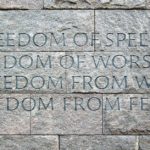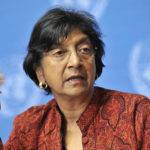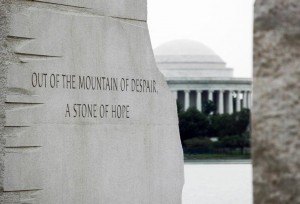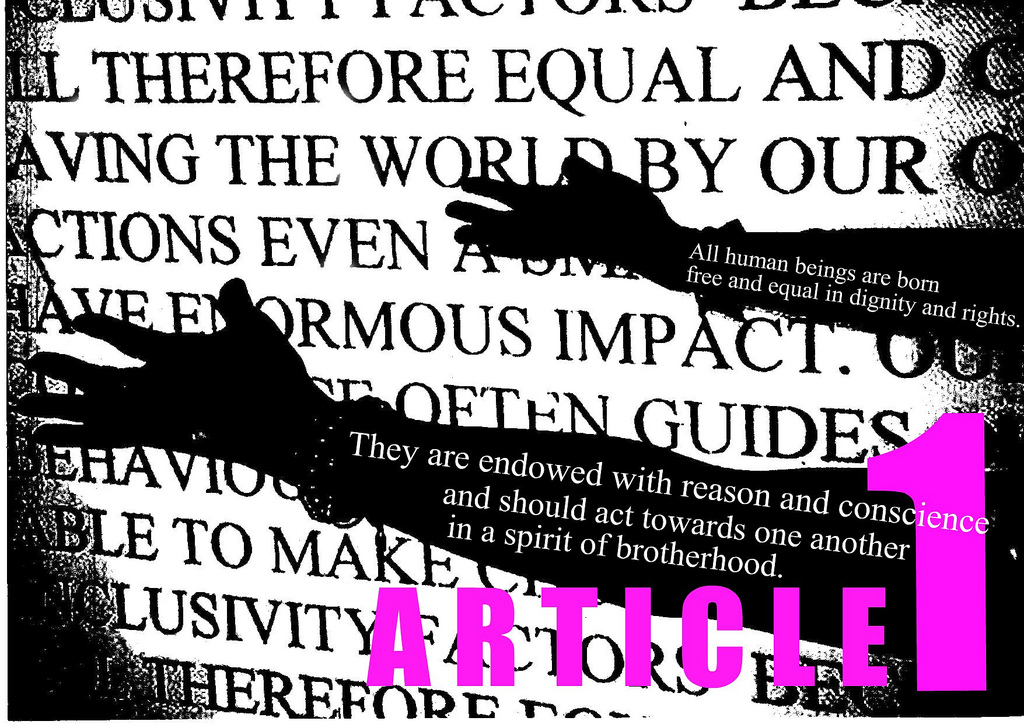
Universal Declaration of Human Rights 2048
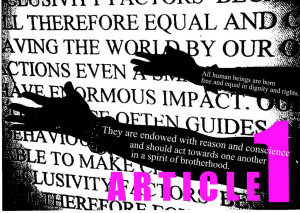 Will the future of human rights look like this?
Will the future of human rights look like this?
After a century of unimaginable suffering in which hundreds of millions of human beings lived in slave like conditions; wars killed millions; millions more fled – many condemned for generations to squalid “refugee” camps; millions starved; where national democracies collapsed under the weight of sectional interests and armed conflict and the environment was stripped of sustainability for wealth for the few, humanity amended the Universal Declaration of Human Rights and issued the new Universal Declaration of Human Rights 2048
Now, Therefore THE GENERAL ASSEMBLY, the directly and democratically elected representatives of all humanity, proclaims THIS UNIVERSAL DECLARATION OF HUMAN RIGHTS 2048 as a common standard which must be achieved by everyone. These rights shall be observed everywhere by everyone and their violation constitute an international crime punishable by the International Criminal Court.
Article 1
All human beings are born free and equal in dignity and rights. They are endowed with reason and conscience and should act towards one another in a spirit of solidarity.
Article 2
Everyone is entitled to all the rights and freedoms set forth in this Declaration, without distinction of any kind, such as race, colour, sex, sexuality, language, religion, political or other opinion, nationality, national or social origin, property, birth or other status. Furthermore, no distinction shall be made on the basis of the political, jurisdictional or international status of the country or territory to which a person belongs, whether it be independent, trust, non-self-governing or under any other limitation of sovereignty.
Article 3
Everyone has the right to life, liberty, peace and security of person. These rights apply in the home, the community, the nation and the world. To ensure the protection of these rights, the production and trade in arms shall be strictly limited and research on the development of armaments is prohibited. Arms may only be produced in limited quantities for the maintenance of community safety. The stockpile and production of arms is subject to international transparency and verification. No commercial entity shall be involved in the production of armaments. The production of battlefield weapons, such as automatic rifles, bombs, grenades, tanks, missiles, military ships, military aircraft and weapons of mass destruction is strictly prohibited.
Article 3A
(1) Everyone has a right to a clean and healthy environment.
(2) Everyone has a responsibility to contribute to the preservation of the environment for the welfare of future generations and the living beings with which we share the planet.
Article 4
No one shall be held in slavery or servitude; slavery and the slave trade shall be prohibited in all their forms.
Article 5
No one shall be subjected to torture or to cruel, inhuman or degrading treatment or punishment.
Article 6
Everyone has the right to recognition everywhere as a person with full rights of a citizen of the jurisdiction in which they live before the law.
Article 7
All are equal before the law and are entitled without any discrimination to equal protection of the law. All are entitled to equal protection against any discrimination in violation of this Declaration and against any incitement to such discrimination. The rights set out in this Declaration may be protected by petition to the International Criminal Court.
Article 8
Everyone has the right to an effective remedy by the competent national and international tribunals for acts violating the fundamental rights granted by this Declaration, the constitution or by law.
Article 9
No one, without exception, shall be subjected to arbitrary arrest, detention or exile.
Article 10
Everyone is entitled in full equality to a fair and public hearing by an independent and impartial tribunal, in the determination of their rights and obligations and of any criminal charge against him or her.
Article 11
(1) Everyone charged with a penal offence has the right to be presumed innocent until proved guilty according to law in a public trial at which he has had all the guarantees necessary for his defence.
(2) No one shall be held guilty of any penal offence on account of any act or omission which did not constitute a penal offence, under national or international law, at the time when it was committed. Nor shall a heavier penalty be imposed than the one that was applicable at the time the penal offence was committed.
Article 12
No one shall be subjected to arbitrary interference with his privacy, personal data, family, home or correspondence, nor to attacks upon their honour and reputation. Everyone has the right to the protection of the law against such interference or attacks.
Article 13
(1) Everyone has the right to freedom of movement and residence within and between all states.
(2) Everyone has the right to enter, work, and live in any country and to leave any country, including his own, and to return to his country.
(3) Everyone has the right to take up residence in any country. On taking up residence in a jurisdiction, a person thereby becomes a citizen of that jurisdiction.
Article 14
(1) Everyone has the right to seek and to enjoy asylum from persecution anywhere on this planet. This right shall not be impeded by any person or institution. This right includes the right to travel by the safest available means, which right shall not be impeded or abrogated.
(2) This right may not be invoked in the case of prosecutions genuinely arising from non-political crimes or from acts contrary to the purposes and principles of the United Nations or this Declaration.
Article 15
(1) Everyone is a citizen of the world, as well of their nation. As a citizen of the world every person enjoys the rights set out in this Declaration, everywhere.
(2) Everyone has the right to a nationality of the country in which they are born, the country in which they are resident and citizenship of any country which recognises their citizenship by descent.
(3) No one shall be arbitrarily deprived of their nationality nor denied the right to change their nationality.
Article 16
(1) Men and women of full age, without any limitation due to race, nationality or religion, have the right to marry and to found a family. They are entitled to equal rights as to marriage, during marriage and at its dissolution.
(2) Marriage shall be entered into only with the free and full consent of the intending spouses.
(3) The family is the natural and fundamental group unit of society and is entitled to protection by society and the State.
Article 17
(1) Everyone has the right to own property alone as well as in association with others.
(2) No one shall be arbitrarily deprived of his property.
Article 18
Everyone has the right to freedom of thought, conscience and religion; this right includes freedom to change his religion or belief, and freedom, either alone or in community with others and in public or private, to manifest his religion or belief in teaching, practice, worship and observance.
Article 19
Everyone has the right to freedom of opinion and expression; this right includes freedom to hold opinions without interference and to seek, receive and impart information and ideas through any media and regardless of frontiers.
Article 20
(1) Everyone has the right to freedom of peaceful assembly and association.
(2) No one may be compelled to belong to an association.
Article 21
(1) Everyone has the right to take part in democratic process wherever they are resident, directly or through freely chosen representatives.
(2) Everyone has the right of equal access to public service everywhere.
(3) The will of the people shall be the basis of the authority of government; this will shall be expressed in periodic and genuine elections which shall be by universal and equal suffrage and shall be held by secret vote or by equivalent free voting procedures.
(4) No one shall be denied the right to vote in their jurisdiction of residence.
Article 22
Everyone, as a member of society, has the right to social security and is entitled to realization, through national effort and international co-operation and in accordance with the organization and resources of each State, of the economic, social and cultural rights indispensable for his dignity and the free development of his personality.
Article 23
(1) Everyone has the right to work, to free choice of employment, to just and favourable conditions of work and to protection against unemployment.
(2) Everyone, without any discrimination, has the right to equal pay for equal work, which right applies to work wherever in the world it is undertaken and irrespective of nationality, taking into account local living costs.
(3) Everyone who works has the right to just and favourable remuneration ensuring for himself and his family an existence worthy of human dignity, and supplemented, if necessary, by other means of social protection. For the protection of this right a global minimum wage shall be established, maintained and enforced everywhere, taking into account local living costs.
(4) Everyone has the right to form and to join trade unions for the protection of his interests.
Article 24
Everyone has the right to rest and leisure, including reasonable limitation of working hours and periodic holidays with pay. It shall be unlawful to fail to pay workers to perform work without payment for work outside normal working hours.
Article 25
(1) Everyone has the right to a standard of living adequate for the health and well-being of himself and of his family, including food, clothing, housing and medical care and necessary social services, and the right to security in the event of unemployment, sickness, disability, widowhood, old age or other lack of livelihood in circumstances beyond his control.
(2) For the protection of this right, democracy, and the welfare of people everywhere, the accumulation of extreme wealth shall not be permitted. No one may retain, for longer than 12 months, wealth which exceeds 50 times the median wealth of their fellow human beings. A person may dispose of their excess wealth by donation to any charitable or public purpose of their choice.
(3) Motherhood and childhood are entitled to special care and assistance. All children, whether born in or out of wedlock, shall enjoy the same social protection.
Article 26
(1) Everyone has the right to education. Education shall be free, at least in the elementary and fundamental stages. Elementary education shall be compulsory. Technical and professional education shall be made generally available and higher education shall be equally accessible to all on the basis of merit.
(2) Education shall be directed to the full development of the human personality and to the strengthening of respect for human rights and fundamental freedoms. It shall promote understanding, tolerance and friendship among all nations, racial or religious groups, and shall further the activities of the United Nations for the maintenance of peace.
(3) Parents have a prior right to choose the kind of education that shall be given to their children.
Article 27
(1) Everyone has the right freely to participate in the cultural life of the community, to enjoy the arts and to share in scientific advancement and its benefits.
(2) Everyone has the right to the protection of the moral and material interests resulting from any scientific, literary or artistic production of which he is the author.
Article 28
Everyone is entitled to a social and international order in which the rights and freedoms set forth in this Declaration can be fully realized. For this purpose the democratisation of international institutions is essential. Everyone shall have the right to participate in the direct election of all representatives representing their country of residence in international institutions.
Article 29
(1) Everyone has duties to the community in which alone the free and full development of his personality is possible.
(2) In the exercise of his rights and freedoms, everyone shall be subject only to such limitations as are determined by law solely for the purpose of securing due recognition and respect for the rights and freedoms of others and of meeting the just requirements of morality, public order and the general welfare in a democratic society.
(3) These rights and freedoms may in no case be exercised contrary to the purposes and principles of the United Nations.
Article 30
Nothing in this Declaration may be interpreted as implying for any State, group or person any right to engage in any activity or to perform any act aimed at the destruction of any of the rights and freedoms set forth herein.
